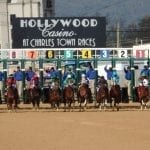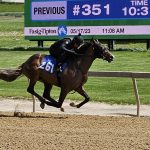WHAT’S MISSING FROM ROBBY ALBARADO COVERAGE

Opinion by Teresa Genaro.
“Swiss Skydiver and Robby Albarado! They’ve done it!”
As Dave Rodman called the tight, thrilling finish in last weekend’s Preakness Stakes, in the midst of my simultaneously cheering on the filly and bemoaning that I hadn’t bet her, I had a sudden thought.
“Robby Albarado? I haven’t heard that name in a long time.”
I recalled, almost immediately, and fleetingly, that Albarado had twice been accused of physically abusing women.
Later that night and into the next day, I started reading Preakness stories from a variety of media outlets. Two in particular stood out to me.
“In the competitive and merry-go-round world of horse racing, Albarado had been left for dead…a series of injuries, including two skull fractures, derailed his career. Bones snapped from his ankle to his shoulder on an annual basis, making him far more regular in physical therapy sessions than jock rooms.”
(New York Times)
“…it’s been a long time, and rugged journey back, since winning in the international spotlight…Albarado sustained two skull fractures, one in 2008 and another the following year. He’s had a host of other serious injuries he’s recovered from, and hasn’t yet won a graded stakes race in 2020. In 2019, his best was a Grade 3 win. He last won a top-level race three years ago.”
(US Racing)
- Spa Selections 2025: Saratoga Picks July 3
 Picks and analysis for today’s key races from Saratoga.
Picks and analysis for today’s key races from Saratoga.
Of course, Albarado getting a Grade 1, Triple Crown race win, is as much a part of the story as Swiss Skydiver’s sex is. So is his fall, from riding in premier races at premier tracks to riding far from the spotlight.
Some publications, like the Baltimore Sun, Daily Racing Form, BloodHorse, and this news site, either ignored Albarado’s past or mentioned it only generally:
He’s had a glittering career — more than 5,200 wins and nearly $220 million in purse earnings — but recent years haven’t been so kind.
(The Racing Biz)
A savvy ride by Albarado – whose otherwise outstanding career had reached its nadir in recent times – was critical to victory.
(Daily Racing Form)
If you’re going to write a game story that doesn’t refer to Albarado’s background (or does so only in passing), fine. You’re focusing on the race.
But I don’t think that you can have it both ways. If you’re going to write about the arc of Albarado’s career, you simply can’t ignore his domestic incidents, their impact on his career — or the human cost they entailed.
The editorial decisions at the Times and US Racing highlight the choices that writers and editors make when dealing with delicate issues, and in this case, the delicate issue is domestic violence.
In 2011 and 2012, Albarado was accused of physically abusing his then-wife (2011) and then-girlfriend (2012). His wife dropped the charges in the first case, and he pled guilty to interfering with a witness. In the second incident, he was charged with a number of offenses and convicted of fourth-degree assault, a conviction that was overturned on appeal.
At the time, Louisville’s WDRB reported that Albarado grabbed his wife’s arm, pushed her against the wall, and strangled her, leaving marks around her throat. You can find details of both incidents here, and an explanation of the conviction being overturned here.
These incidents were nearly a decade ago, and I do not subscribe to the idea that people’s bad behavior should affect the rest of their lives. The problem I see is not so much with Albarado per se — though multiple accusations of abusing women are, to put it mildly, troubling — but with the coverage of him.
- Edy’s Flame heats up in first CT 2yo race
 Edy’s Flame dominated Charles Town’s first 2yo race of the year, a somewhat surprising result even if bettors focused on the right connections.
Edy’s Flame dominated Charles Town’s first 2yo race of the year, a somewhat surprising result even if bettors focused on the right connections.
Readers of the stories in the New York Times and US Racing who are unfamiliar with Albarado’s story would draw the sympathetic conclusion that a barrage of injuries led to his fall from the top tier of riders in the U.S. and that the faith of trainer Ken McPeek and a win in the Preakness are a triumph over adversity. That may in fact be true, but it’s not the whole story.
Following the second accusation against him, which took place the day before the Kentucky Oaks, Albarado was suspended indefinitely by Churchill Downs stewards. The Kentucky Horse Racing Commission suspended him indefinitely, but soon afterwards he obtained an injunction that allowed him to contniue riding, according to the Daily Racing Form. Perhaps coincidentally, perhaps not, Albarado’s mounts plummeted in the years of his arrests, from 1,070 in 2010 to 675 in 2011 and 812 in 2012.
It is disingenuous, if not dishonest, to leave Albarado’s personal problems out of a discussion of his fall from riding grace in the mid-2010s. It is also a slap in the face to the women who brought charges against him, and to all women in racing and beyond who have been the victim of domestic violence.
The New York Times article saw fit to mention Bob Baffert’s history of medication violations with horses that weren’t even running in the Preakness, yet it valorized and romanticized Albarado, calling him an “old, broken up” jockey who “summoned his instincts of old,” the last line of the story a quote by trainer McPeek: “’I’m really proud of Robby.’”
Albarado even made the headline: “Swiss Skydiver, With a Last-Minute Jockey, Wins the Preakness Stakes.”
Should Albarado’s masterful ride on Swiss Skydiver be praised? Of course. Is it affirming to see a talented, potential Hall of Fame jockey back on the top of his game after years out of the spotlight? No doubt.
At the same time, it is possible — no, essential — to acknowledge what Albarado accomplished, the hardships he’s gone through…and to include that some of those problems that kept him off the top horses over the last few years were of his own making.
What is not acceptable is to mention the injuries that Albarado has suffered, while overlooking those that he inflicted on the women in his life.
LATEST NEWS















I couldn’t agree more. My same reaction when I read the NY Times story.
You bring up some excellent points.However,it needs to be pointed out when Robby lost his terrific long time agent he lost a number of top stables.
I guess the point here is that ALL aspects of a story need equal exposition if you are going to do balanced reporting. Therefore not only his past history of offenses should be included but also the effect of the loss of his agent and perhaps his clean record now for whatever period of time that is?
And perhaps including in the story the extent of his THIs and a reminder that such can lead to behavioral changes regardless of physical healing.